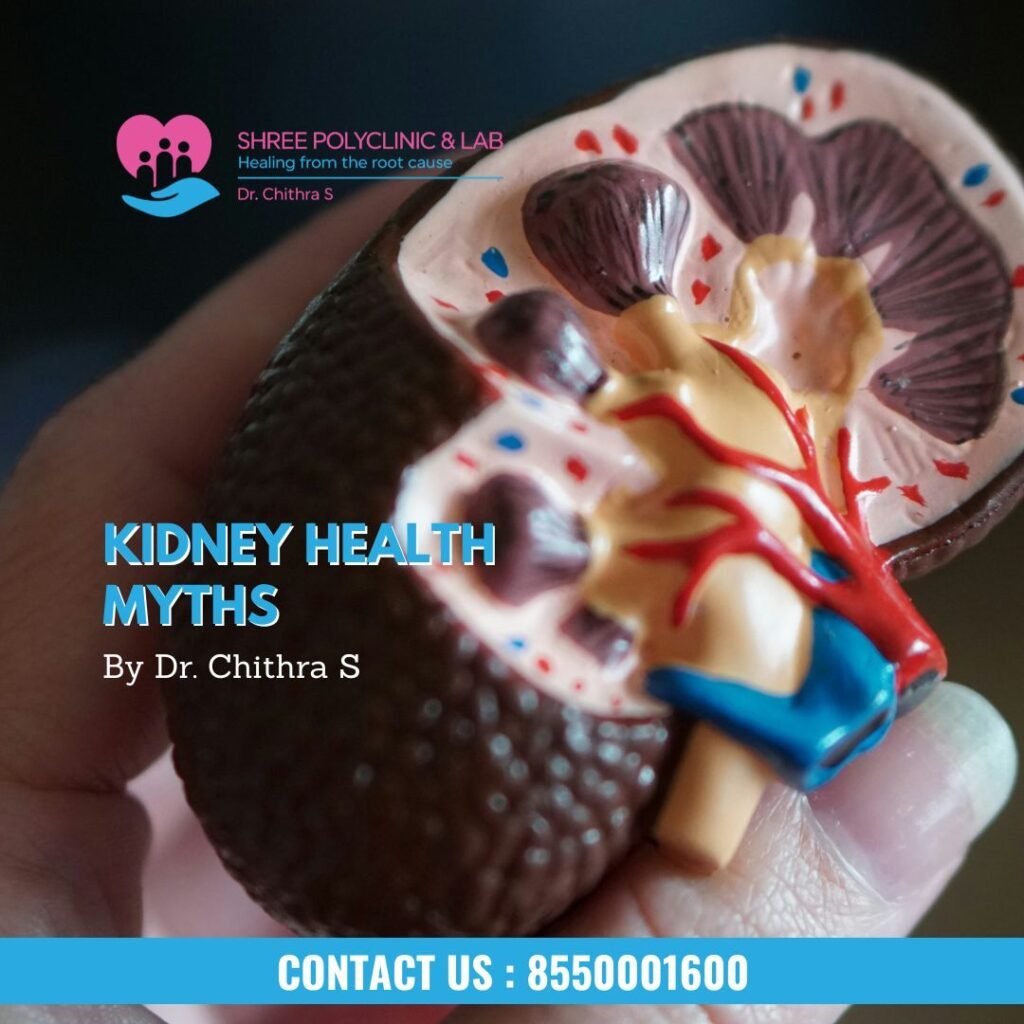Introduction
Kidney health is essential for overall well-being, yet several myths surround kidney function, hydration, and dietary supplements. With World Kidney Day approaching on March 13, it’s time to separate facts from fiction to help you take better care of your kidneys. In this blog, we’ll debunk common kidney health myths, explore the truth about hydration, and discuss kidney stones—causes, prevention, and treatment.
Myth #1: Drinking Too Much Water is Always Good for Your Kidneys
Fact: While staying hydrated is important for kidney function, excessive water intake can strain the kidneys rather than help them. The kidneys regulate fluid balance, and overhydration can lead to hyponatremia (low sodium levels), which can be dangerous. The ideal daily water intake varies based on age, climate, and activity levels. A general rule is 8–10 glasses per day, but people with kidney disease should follow medical advice on fluid intake.
Myth #2: Kidney Disease Always Shows Symptoms in the Early Stages
Fact: Kidney disease is often called a “silent killer” because symptoms may not appear until the disease is advanced. Signs such as fatigue, swelling, and changes in urination may develop only when the kidneys have already lost significant function. Regular kidney function tests (such as creatinine and GFR tests) can detect issues early, even if you feel fine.
Myth #3: Supplements and Herbal Remedies Can “Detox” Your Kidneys
Fact: The kidneys naturally filter toxins from the blood, and no supplement is required to detox them. Some herbal remedies marketed for kidney health can actually be harmful, especially if they contain high amounts of potassium or cause dehydration. Always consult a doctor before taking supplements, especially if you have existing kidney conditions.
Myth #4: If You Have Kidney Stones, You Should Avoid Calcium
Fact: Many people believe that calcium causes kidney stones, but the truth is that calcium helps prevent certain types of stones. Calcium binds with oxalate in the intestines, preventing oxalate from forming stones in the kidneys. Instead of eliminating calcium, it’s important to balance your calcium and oxalate intake by eating dairy in moderation and avoiding high-oxalate foods like spinach and chocolate.
Kidney Stones: Causes, Prevention, and Treatment
Causes of Kidney Stones
Kidney stones form when minerals and salts crystallize in the kidneys due to: ✔ Dehydration – Lack of fluids leads to concentrated urine, which promotes stone formation.
✔ High Salt & Oxalate Intake – Excess sodium and oxalate-rich foods can trigger stone growth.
✔ Lack of Dietary Calcium – Insufficient calcium can increase the risk of calcium oxalate stones.
✔ Genetics – A family history of kidney stones raises the risk.
✔ Certain Medical Conditions – Diabetes, obesity, and urinary tract infections contribute to kidney stone development.
How to Prevent Kidney Stones
✅ Drink Enough Water – Aim for at least 2–3 liters per day to keep urine diluted.
✅ Limit Salt & Sugar – High sodium intake can increase calcium in urine, promoting stones.
✅ Eat Kidney-Friendly Foods – Balance calcium intake, reduce high-oxalate foods, and include citrus fruits (lemons, oranges) to reduce stone risk.
✅ Maintain a Healthy Weight – Obesity and poor diet increase the chances of stone formation.
✅ Avoid Excessive Protein Intake – Too much red meat or animal protein can raise uric acid levels, leading to uric acid stones.
Treatment for Kidney Stones
Treatment depends on the size and type of the stone:
- Small Stones (<5mm): Can often pass naturally with increased water intake and pain management.
- Medium Stones (5-10mm): May require medications to relax the urinary tract and assist in passing.
- Large Stones (>10mm): Might need shock wave therapy (ESWL), ureteroscopy, or surgery to remove.
Final Thoughts: Protect Your Kidneys for Life
Understanding the truth about kidney health can help you make better lifestyle choices and reduce your risk of kidney disease. Stay hydrated, eat a balanced diet, limit processed foods, and get regular checkups to keep your kidneys functioning optimally.
Worried about your kidney health? Visit Shree Polyclinic & Lab for a kidney function test and expert consultation. Your kidneys work hard for you—let’s take care of them!
🔗 Book an appointment today!
#KidneyHealth #WorldKidneyDay #HealthyKidneys #KidneyStones #Hydration #ShreePolyclinic

